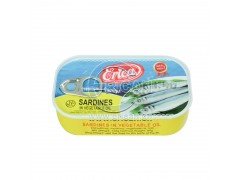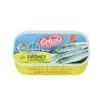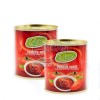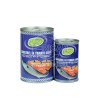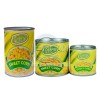What Are Sardines?
The sardine — sometimes also referred to as the pilchard or herring fish — is a type of small, oily fish that belongs to the Clupeid family. This fish can be found in many different regions, including the Pacific and Mediterranean, and typically feed on plankton.
Sardines as food are tasty and bursting with important nutrients, making them a worthy addition to any diet. Not only are they rich in omega-3 fatty acids, but they’re also loaded with protein and essential nutrients like vitamin B12 and selenium. Plus, they’ve been associated with a number of health benefits, ranging from better bone health to increased weight loss and beyond.
Although these delicious fish can be purchased fresh, they are most often consumed canned for a convenient and power-packed meal or snack. They also have a distinct signature flavor that works well in many different dishes and recipes, such as salads and pastas.
Nutrition Facts
The sardine nutrition profile is high in protein and heart-healthy fats as well as important micronutrients like vitamin B12, selenium and phosphorus.
One 3.75-ounce can (about 92 grams) of Atlantic sardines contains approximately: (1)
• 191 calories
• 22.7 grams protein
• 10.5 grams fat
• 8.2 micrograms vitamin B12 (137 percent DV)
• 48.5 micrograms selenium (69 percent DV)
• 250 international units vitamin D (63 percent DV)
• 451 milligrams phosphorus (45 percent DV)
• 351 milligrams calcium (35 percent DV)
• 4.8 milligrams niacin (24 percent DV)
• 2.7 milligrams iron (15 percent DV)
• 365 milligrams potassium (10 percent DV)
• 35.9 milligrams magnesium (9 percent DV)
• 0.2 milligrams copper (9 percent DV)
• 1.9 milligrams vitamin E (9 percent DV)
• 0.2 milligrams vitamin B6 (8 percent DV)
• 1.2 milligrams zinc (8 percent DV)
Sardines are jam-packed with important nutrients, securing them a top spot as one of the most nutrient-dense foods on the planet. High in omega-3 fatty acids, protein, vitamin B12 and selenium, sardines in a can are one of the few ingredients on the market that are super healthy, budget-friendly, convenient and delicious.
So why are sardines good for you? Sardines health benefits range from reduced levels of inflammation to enhanced bone health and increased weight loss. Plus, they supply a wide array of important vitamins and minerals for a low amount of calories and can be a versatile addition to a nutritious diet.
Little tins of sunshine. Each tin of sardines in vegetable oil is bursting with vitamin D, the sunshine vitamin, and full of healthful Omega 3s. And that's on top of being wild-caught in the waters off the coast of Galicia in northwest Spain. And that is on top of being plump, and tender, and delicious. A best-seller.
Sardines hand-packed fresh from the sea in vegetable oil and salt only, the traditional method. Caught via sustainable techniques. You can eat them straight from the tin or skewer them on a toothpick with a guindilla pepper and cherry tomato atop a slice of crusty bread for a quick pintxo.
Product Description
|
Item |
Canned Sardines in Vegetable oil 125g |
|
Ingredients |
Sardines (fish), vegetable oil/soya bean oil/sunflower oil/olive oil, salt |
|
Packing |
125gx105/ctn with shrink wrap or 125gx50/ctn |
|
OEM |
Welcome |
|
Sample |
FREE |
|
Certification |
HACCP, ISO, HALLA |
|
Loading details |
125gx50/ctn, 3200ctns/20'fcl; 125gx25/ctn 6300 ctns/20'fcl |
|
Minimum order |
1x20 feet container |
Our advantage
The Erica sardines and mackerel canning plants have been operating since 2009 in the town of zhangzhou China which faces the Ocean in an area considered to be one of the world's canned food zone.
The Erica management team, whose technical experience in the field of "fish canning industry" produces today various types of canned sardines and mackerel, such as plain and fillets, in vegetable or olive oil, in tomato or in brine, with lemon etc...
Erica's production policy is aimed strictly on the quality of their raw materials and their suppliers are accessed by frequent controls carried out by the in-house laboratory.
Erica produce their own brands and also customers's own brands, in a variety of cans in both tin plate an aluminium, with keys, easy-open, in both lithographed or plain cans in carton ettes.
Production Process
1. PHASE ONE OF THE PRODUCTION PROCESS
Sardine is delivered to our factory either directly from the fishing vessel or from reefer ships delivering from fishing companies. The majority of the sardine delivered is frozen. So we need to defrost the raw materials.
2. PHASE TWO OF THE PRODUCTION PROCESS
First we clean the whole pieces and slices and remove the skin, bones, fins, and any remaining entrails or dark meat. The fillets are then cut for subsequent packaging.
Packaging, adding liquid to cover them, and closing the containers
Once parts have been cleaned, they are then manually packaged, the sauces are prepared and the liquids to cover them are added: oil, brine, or sauce.
3. PHASE THREE OF THE PRODUCTION PROCESS
Sterilization and final cooling of the containers. The temperatures and sterilization times are standardized by the company and vary depending on the sizes, products, and packing liquids that are to be sterilized. They are rapidly cooled via overpressure to avoid any deformations in the containers.
visit our website:https://www.ericanfood.com/product-hot-sale-125g-canned-sardine.html


